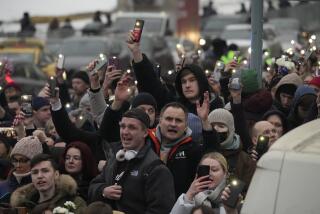Anatoly A. Sobchak; Russian Reformer, Putin Mentor
- Share via
MOSCOW — In the heady upward swing of his career, in the early 1990s, Anatoly A. Sobchak was St. Petersburg’s mayor, a heroic defender of democracy, a man many thought would rise higher. But Sobchak, who died early Sunday at 62, sank fast in an ignominious spiral: He grew unpopular, was voted out of office in 1996 and was dogged by a corruption investigation.
In the end, it was not Sobchak but his former deputy and right-hand man who was to make the dizzying rise: Vladimir V. Putin, named Russia’s acting president New Year’s Eve and expected to win a presidential election March 26.
When Putin took office, Sobchak, after several years of relative obscurity, suddenly was sought after. His star was seen as being on the rise again.
He was stationed as Putin’s campaign manager in Kaliningrad, on the Baltic coast, when he died, reportedly of a heart attack. A doctor who treated him for a major heart attack in 1997, Nikita Semigolovsky, said Sobchak had been seriously ill for 2 1/2 years and could have died at any time.
The 1997 attack, his third, came while he was being interrogated about corruption charges by officials from the St. Petersburg prosecutor’s office. Sobchak’s opponents sneered that he was faking the illness.
After he flew to Paris for further medical treatment, critics contended that he was fleeing to avoid prosecution. Sobchak did not come home for two years, during which time the prosecutor filed bribery charges against him, reinforcing the critics’ view.
When Sobchak returned to Russia from Paris last summer, Putin--by then director of the FSB, the main successor agency to the Soviet KGB--was there to meet him at the St. Petersburg airport in a gesture of protection and support.
Sobchak was born in Chita, in eastern Siberia. He was a law professor at Leningrad State University before going into politics. One of his students was Putin. When Sobchak became mayor of St. Petersburg, then still called Leningrad, in 1991, he made Putin his deputy.
After Sobchak lost office in 1996, Putin went to Moscow. But Sobchak, like other pro-Western “reformers,” was tainted by the 1997 allegations that he had taken bribes in the form of property from a real estate company.
Like retired President Boris N. Yeltsin, Sobchak had worked to pull down the Communist Party in the late 1980s, but he was more eloquent and cerebral than Yeltsin. As a member of the Congress of People’s Deputies, the Soviet parliament, he took on Communist hard-liners in televised debates. Later, during the hard-liners’ attempted coup in 1991 against then-President Mikhail S. Gorbachev, he mobilized tens of thousands of people in the streets and refused to let troops enter his city.
While Sobchak was mayor, Leningrad reverted to its old imperial name and many architectural treasures were restored. But people who had rallied behind his democratic banner complained that he neglected basic social services, like collecting garbage.
He set his sights high, aiming to make St. Petersburg an international city, the doorway to Europe. But his efforts, and those of his deputy, Putin, to build the city as a financial power to rival Moscow failed, and St. Petersburg also fell short of expectations as a tourist destination. What it did become, on their watch, was one of the most criminalized cities in Russia.
In May 1996 elections, determined to hold onto power, Sobchak resorted to media manipulation in a negative campaign that many said soiled his reputation as a democrat. He tried for a seat in the Russian parliament in last December’s election but lost.
Sobchak’s fortunes and his fall trace those of democracy itself in Russia. By the time he lost office, “democrat” was a pejorative word.
“He in fact symbolized the Russian epoch of the last decade with all its contradictions and complexities. He was a man who fulfilled his task when it was somewhat easier and when it was quite difficult,” said Anatoly B. Chubais, one of Sobchak’s supporters and another discredited “reformer” from St. Petersburg who heads Unified Energy Systems of Russia, the electric power monopoly.
Sunday night, Chubais spoke bitterly about those who pursued Sobchak for corruption, claiming that they had hounded him to his grave.
Pavel I. Voshchanov, a journalist with the daily Tribuna, is one of those pursuers and is writing a book on what he says were Sobchak’s crimes.
Also speaking Sunday night, Voshchanov said: “If Sobchak symbolized anything, it was the false democracy built in Russia, based on all-embracing corruption and total lack of morals. . . . He and many other so-called liberal politicians effectively counterfeited democracy in Russia.”
The gulf between the two viewpoints represents the legacy of men like Sobchak and Yeltsin: a nation deeply divided about the merits of the trail they blazed.
More to Read
Sign up for Essential California
The most important California stories and recommendations in your inbox every morning.
You may occasionally receive promotional content from the Los Angeles Times.













